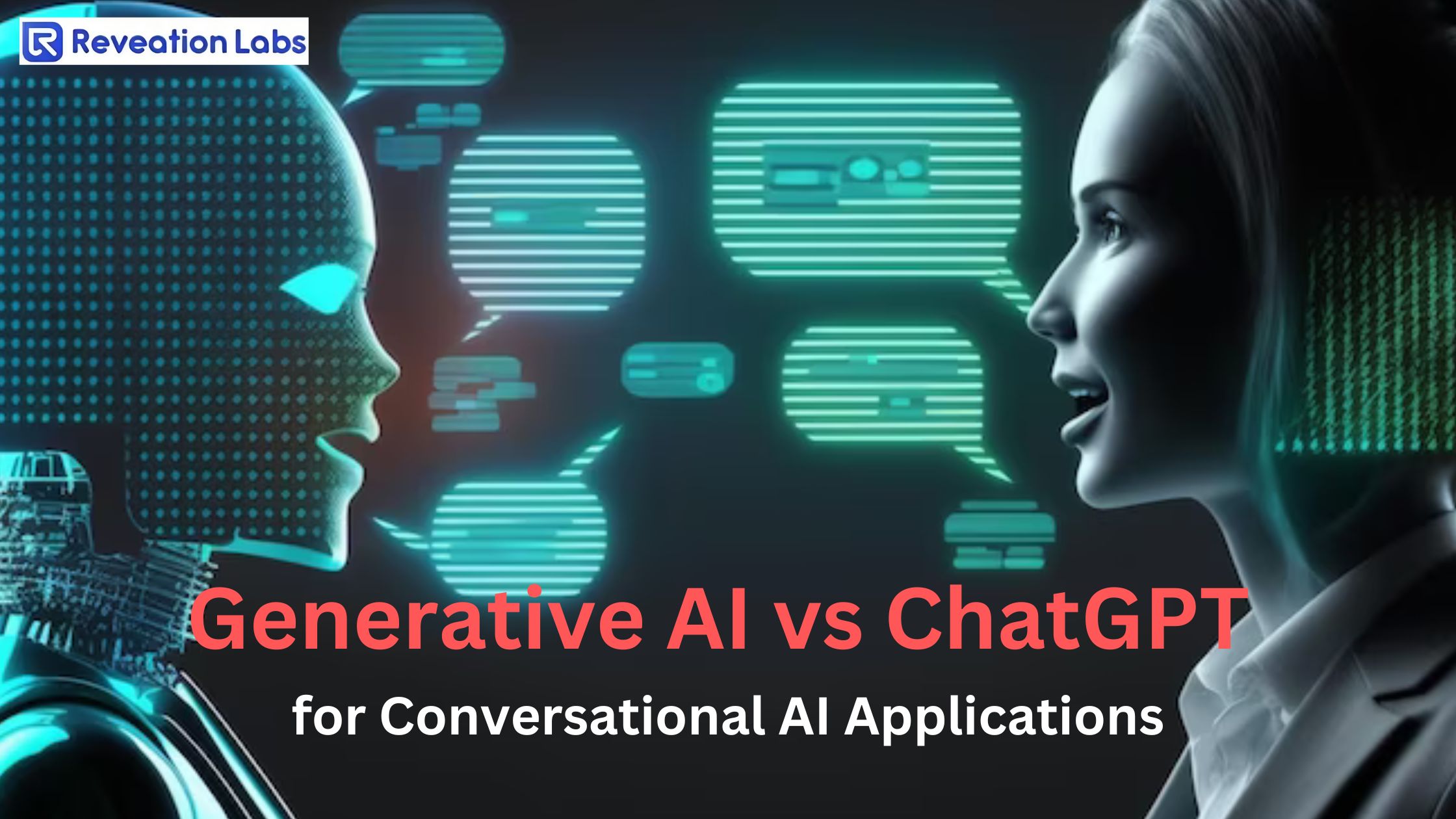Jhansi Pothuru
Wed Nov 15 2023


So, what's this Generative AI buzz all about? Well, imagine a super-smart computer that can create things on its own, like generating art, writing stories, or even crafting music.
It's like having a creative robot friend that comes up with cool stuff without being told exactly what to do. That's Generative AI for you!
Importance of Generative AI in Shaping Personalized User Experiences
Now, why should we care? Generative AI is a game-changer, especially when it comes to making things personal.
Think of the last time you got awesome song recommendations on a music app or spot-on movie suggestions. That's Generative AI at work, tailoring your experience based on what it knows about you. It's like having a virtual assistant that knows your taste better than you do!
Impact of Generative AI on Personalization in Marketing, Content Recommendations, and Product Design
Alright, now let's get to the interesting part!
We're on a mission to explore how Generative AI is making a huge impact in three crucial areas:
Generative AI in Marketing
Generative AI, or Generative Adversarial Networks (GANs), is a subset of artificial intelligence that involves two neural networks – a generator and a discriminator – engaged in a continual competition to improve the generation of data.
In the context of marketing, Generative AI refers to using these technologies to create content, designs, and personalized experiences that are tailored to individual preferences and behaviors.
Applications of Generative AI in Marketing
Content Creation: Generative AI can be employed to generate high-quality, personalized content for marketing campaigns, including ad copy, blog posts, and social media updates.
Creative Design: It can be used to create visually appealing designs for marketing materials such as banners, logos, and product images, ensuring a consistent brand image.
Personalized Recommendations: Generative AI can analyze customer data to generate personalized product or content recommendations, enhancing the overall customer experience.
Chatbots and Virtual Assistants: AI-driven chatbots and virtual assistants can provide personalized interactions with customers, answering queries and guiding them through the purchasing process.
Case Studies: Successful Implementations of Generative AI in Personalized Marketing:
Netflix: Netflix utilizes Generative AI to analyze user viewing patterns and preferences, providing personalized recommendations for movies and TV shows.
Adobe: Adobe's Sensei, a machine learning and AI platform, helps marketers generate personalized content and designs based on user behavior and engagement metrics.
Sephora: The beauty retailer uses AI to offer personalized product recommendations, leveraging customer data to suggest makeup and skincare products tailored to individual preferences.
Benefits of Generative AI in Targeted Advertising and Customer Engagement:
Personalization: Generative AI enables marketers to create highly personalized content, ads, and recommendations tailored to individual user preferences. This personal touch enhances customer engagement and can lead to higher conversion rates.
Efficiency: Automation of content creation and ad design processes through Generative AI saves time and resources for marketing teams. This efficiency allows marketers to focus on strategic planning and creative aspects of campaigns.
Improved Targeting: Generative AI can analyze large datasets to identify specific audience segments and deliver targeted advertising. This leads to more effective marketing campaigns and can tailor their messages to the interests and behaviors of distinct customer groups.
Enhanced Creativity: Generative AI can assist in creative processes by suggesting new ideas, designs, and content variations. This collaboration between human creativity and AI innovation can lead to more compelling and innovative marketing materials.
Continuous Learning: Generative AI systems can adapt and learn from user interactions, refining their understanding of customer preferences over time. This continuous learning allows for increasingly accurate personalization and targeted engagement.
Challenges of Generative AI in Targeted Advertising and Customer Engagement:
Ethical Concerns: The use of Generative AI in marketing raises ethical considerations, especially regarding data privacy and the responsible use of customer information. Marketers must navigate these concerns to build and maintain trust with their audience.
Quality Control: Ensuring that AI-generated content aligns with brand standards and maintains quality can be a challenge. Marketers need mechanisms in place to review and approve AI-generated materials to prevent inconsistencies or undesirable outputs.
Interpretable Outputs: Generative AI systems can sometimes produce results that are difficult to interpret or explain. Marketers may face challenges in understanding the reasoning behind AI-generated decisions, which is crucial for maintaining transparency and accountability.
Integration Complexity: Integrating Generative AI into existing marketing workflows can be complex. Marketers need to ensure seamless integration with other tools and technologies to maximize the benefits of AI while minimizing disruption.
Overreliance on Data: Generative AI relies heavily on the data it is trained on. If the training data is biased or incomplete, it can lead to skewed results and reinforce existing biases. Marketers must be vigilant in addressing and mitigating biases in AI algorithms.
Consumer Perception: Some consumers may feel uncomfortable or uneasy interacting with AI-generated content. Marketers need to carefully consider how to present and disclose the use of AI in their advertising to avoid negative reactions from customers.
While Generative AI offers significant benefits in enhancing targeted advertising and customer engagement, marketers must navigate challenges related to ethics, quality control, interpretability, integration, data biases, and consumer perception to utilize these technologies effectively.
Generative AI in Content Recommendations
Generative AI plays a crucial role in content recommendation systems by leveraging advanced algorithms to analyze user behavior, preferences, and historical data. These systems aim to provide users with personalized content suggestions, enhancing their overall experience and engagement with a platform.
Applications of Generative AI in Content Recommendations
Video Streaming Platforms: Services like Netflix and YouTube use Generative AI to analyze viewing history, user ratings, and other factors to recommend movies, TV shows, or videos tailored to individual tastes.
Music Streaming Services: Platforms such as Spotify use Generative AI to analyze user listening habits, generating personalized playlists and song recommendations based on individual preferences.
E-commerce Platforms: Retailers like Amazon utilize Generative AI to analyze users' purchase history, browsing behavior, and interactions with the platform to recommend products that align with their interests.
News Aggregators: Generative AI is employed by news platforms to analyze reading habits and preferences, offering personalized news articles and content recommendations.
Case Studies: Real Examples of Generative AI Improving Content Discovery
Netflix:
Netflix employs Generative AI algorithms to analyze user viewing patterns and preferences.
The recommendation system suggests personalized content, leading to increased user satisfaction and longer viewing sessions.
Spotify:
Spotify uses Generative AI to analyze user-generated playlists, listening history, and preferences.
The platform generates personalized playlists like Discover Weekly, introducing users to new music based on their tastes.
YouTube:
YouTube utilizes Generative AI to recommend videos based on users' watch history, likes, and subscriptions.
The recommendation algorithm aims to keep users engaged by suggesting content that aligns with their interests.
Personalization Algorithms: How Generative AI Tailors Content Recommendations to Individual Preferences:
1. Collaborative Filtering: Generative AI systems use collaborative filtering algorithms to recommend content based on the preferences of users with similar tastes. This approach is effective for suggesting items that a user might like based on the preferences of a group of like-minded users.
2. Content Embeddings: Generative AI utilizes embeddings to represent content and user preferences in a multi-dimensional space. This allows the system to identify patterns and similarities, enabling accurate content recommendations.
3. Recurrent Neural Networks (RNNs): Recurrent Neural Networks RNNs are used to capture sequential patterns in user behavior, making them effective for predicting the next item a user might be interested in based on their historical interactions with content.
4. Generative Adversarial Networks (GANs): Generative Adversarial Networks (GANs) can be employed to generate synthetic user profiles or content, expanding the recommendation system's understanding of user preferences and providing more diverse recommendations.
Ethical Considerations: Addressing Concerns Related to Privacy and Algorithmic Bias in Content Personalization:
Privacy Concerns:
Platforms need to ensure that user data used for personalization is handled with care, and transparent privacy policies should be in place.
Users should have control over their data, with options to opt in or out of personalized recommendations.
Algorithmic Bias:
Generative AI systems may inadvertently perpetuate biases present in training data, leading to biased recommendations.
Regular audits and diversity checks are necessary to identify and address biases in content recommendation algorithms.
Transparency:
Users should be informed about how recommendation algorithms work, and platforms should strive for transparency in explaining the factors influencing content suggestions.
Clear disclosure about the use of Generative AI in content personalization is crucial for building trust.
Algorithmic Fairness:
Content recommendation algorithms should be designed to ensure fairness, avoiding discrimination based on factors such as race, gender, or socioeconomic status.
Continuous monitoring and adjustments are necessary to address and mitigate any unintended biases.
In summary, while Generative AI enhances content recommendations by providing personalized and engaging experiences, addressing ethical considerations related to privacy, algorithmic bias, and transparency is crucial for ensuring a positive user experience and maintaining trust in these systems.
Integration of Generative AI in Product Design Processes
Generative AI is increasingly integrated into product design processes, transforming the way designers conceptualize, iterate, and optimize products. By leveraging algorithms and machine learning, Generative AI contributes to innovative design solutions, often surpassing human capabilities in generating novel and efficient designs.
Applications of Integrating Generative AI in Product Design Processes
1. Concept Generation: Generative AI helps designers in brainstorming and ideation by rapidly generating diverse design concepts based on specified parameters and constraints.
2. Optimization: It helps optimize designs by analyzing various factors, such as materials, weight, and structural integrity, to enhance functionality and efficiency.
3. Prototyping: Generative AI assists in the creation of prototypes by generating and refining designs, allowing designers to explore a wide range of possibilities before selecting the most suitable option.
4. Automated Design: It enables the automation of certain design tasks, reducing the manual effort required for routine design processes and allowing designers to focus on more complex and creative aspects.
Suggested: How ChatGPT Developers Can Transform Your Business?
Customization and Personalization: How Generative AI Allows for Tailored Product Experiences:
Generative AI plays a significant role in enabling customization and personalization in product design and manufacturing. By leveraging advanced algorithms and machine learning, Generative AI facilitates the creation of tailored product experiences for individual consumers. Here's how:
1. Mass Customization:
Generative AI allows for the creation of variations of a product to meet specific individual preferences without compromising efficiency in production.
Designers can set parameters, and the AI generates a range of customized options, enabling mass customization on a scale that was not feasible with traditional manufacturing processes.
2. User-Driven Design:
Generative AI can incorporate user input and preferences into the design process.
Consumers may provide specific requirements or preferences, and the AI generates product designs that align with individual tastes, ensuring a more personalized and engaging experience.
3. Adaptive Design:
Generative AI enables adaptive design that evolves over time based on user feedback and changing trends.
Products can be continuously refined and updated to align with individual preferences and evolving market demands, providing a dynamic and personalized product experience.
4. Dynamic Personalization:
Through continuous analysis of user behavior and feedback, Generative AI can dynamically personalize products in real-time.
This dynamic personalization ensures that products remain relevant and engaging throughout the customer's interaction with the brand.
5. Configuration Options:
Generative AI allows users to configure and customize products based on a set of predefined options.
Customers can choose specific features, colors, sizes, and other parameters, and the AI generates a product design that reflects these selections.
6. Unique Iterations:
Generative AI can generate a vast number of unique design iterations.
This capability allows for the creation of one-of-a-kind products, providing consumers with a sense of exclusivity and personal connection to their purchases.
7. Personalized Recommendations:
By analyzing customer data, preferences, and purchase history, Generative AI can offer personalized product recommendations.
This enhances the overall shopping experience, helping customers discover products that align with their individual tastes and needs.
8. Cross-Channel Consistency:
Generative AI can ensure consistency in personalized experiences across various channels and touchpoints.
Whether a customer interacts with a brand online, in-store, or through other channels, the tailored product experiences can remain cohesive and personalized.
Real-World Applications: Examples of Successful Product Design Driven by Generative AI:
Autodesk's Generative Design: Autodesk's generative design tools use algorithms to explore numerous design iterations for components such as aerospace parts or automotive structures. This optimizes for factors like weight, strength, and cost.
Nike's Generative Design for Shoes: Nike has utilized Generative AI to design midsoles for shoes. The algorithm creates intricate patterns that balance performance, comfort, and aesthetics, leading to innovative and personalized designs.
Generative Jewelry Design: In the jewelry industry, designers use Generative AI to create unique and intricate designs based on customer preferences. This allows for highly personalized and one-of-a-kind pieces.
Conclusion
In wrapping up, Generative AI is like a super tool for making stuff, especially products. It's changing how we create things by making them more special and just right for each person. Think of it like getting a personalized version of something, like shoes or a phone case, that suits your style perfectly. Big companies like Autodesk and Nike are already using Generative AI to create amazing and unique designs.
But, there are some challenges to figure out. Making sure things still work well when we're making a lot of them and keeping an eye on quality are important. We also need to be careful about being fair and doing things the right way. Looking ahead, we can expect even cooler things, like designs changing in real-time based on what people like, and finding new and better materials. The future seems bright, where products will not just be cool but also made just for you.
Why Reveation Labs
We are a team that is technically proficient and simultaneously caring for your business. Our ideology is to provide the latest technologies that suit your business well.
Let’s discuss your requirements!
Give your business the next-gen technology it deserves. Be a part of our family of successful enterprises that work on high-end software solutions.
Experts
In all the latest technologies and developments.
Creative
To innovate the best solutions and pick the right technology for you.
Ethical
To always put you first & respect your business values and procedures.
Dedicated
To meet the deadlines and help you until the very end and beyond.
Approachable
For all your business needs and queries at any point of time.
Transparent
In our ways of working.




